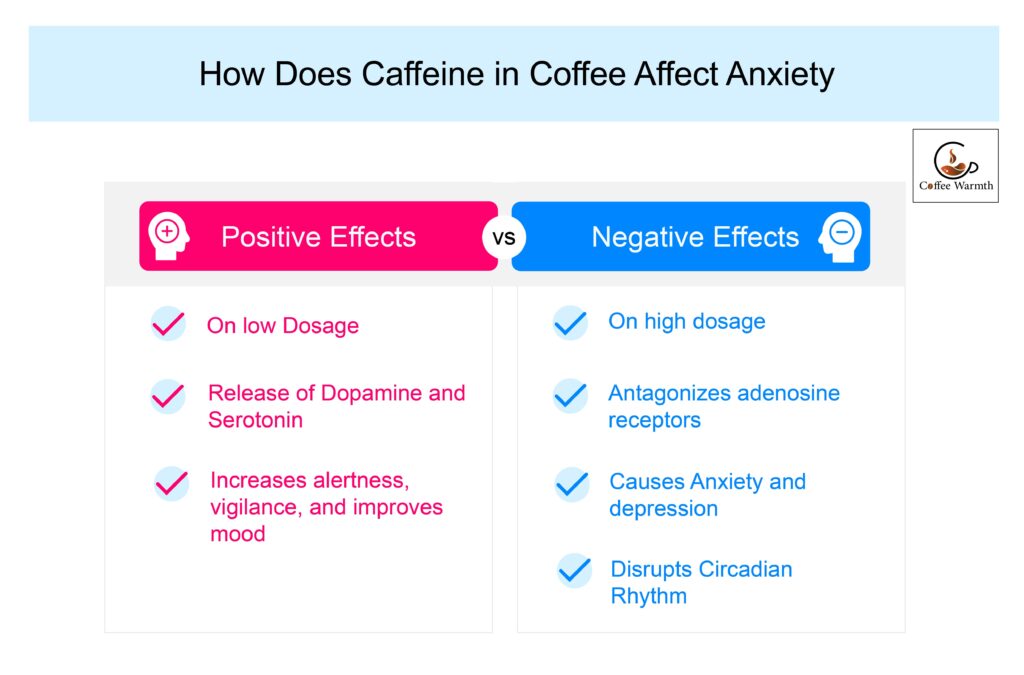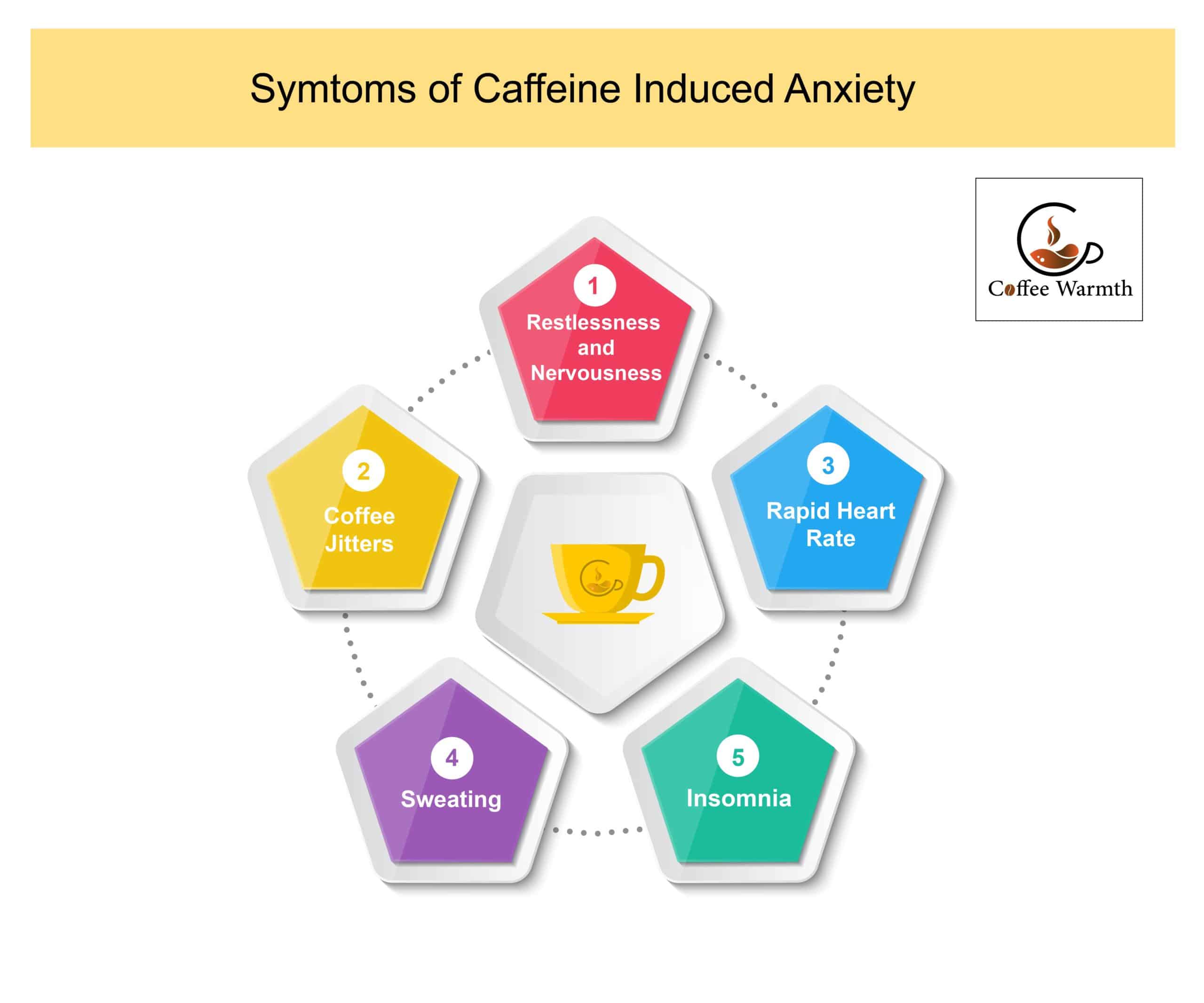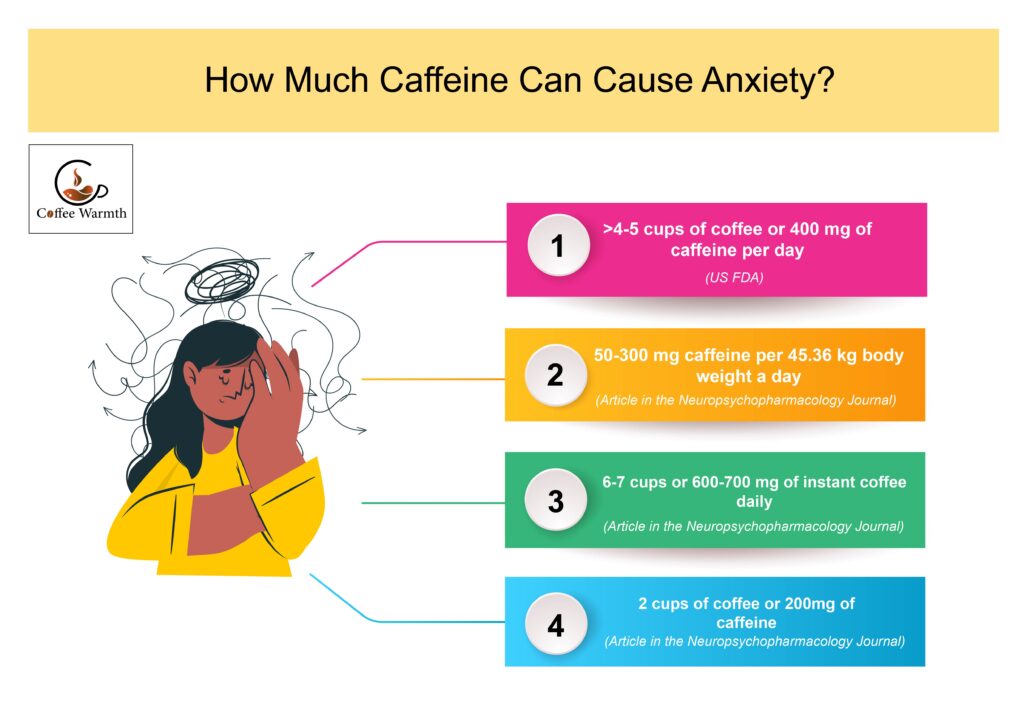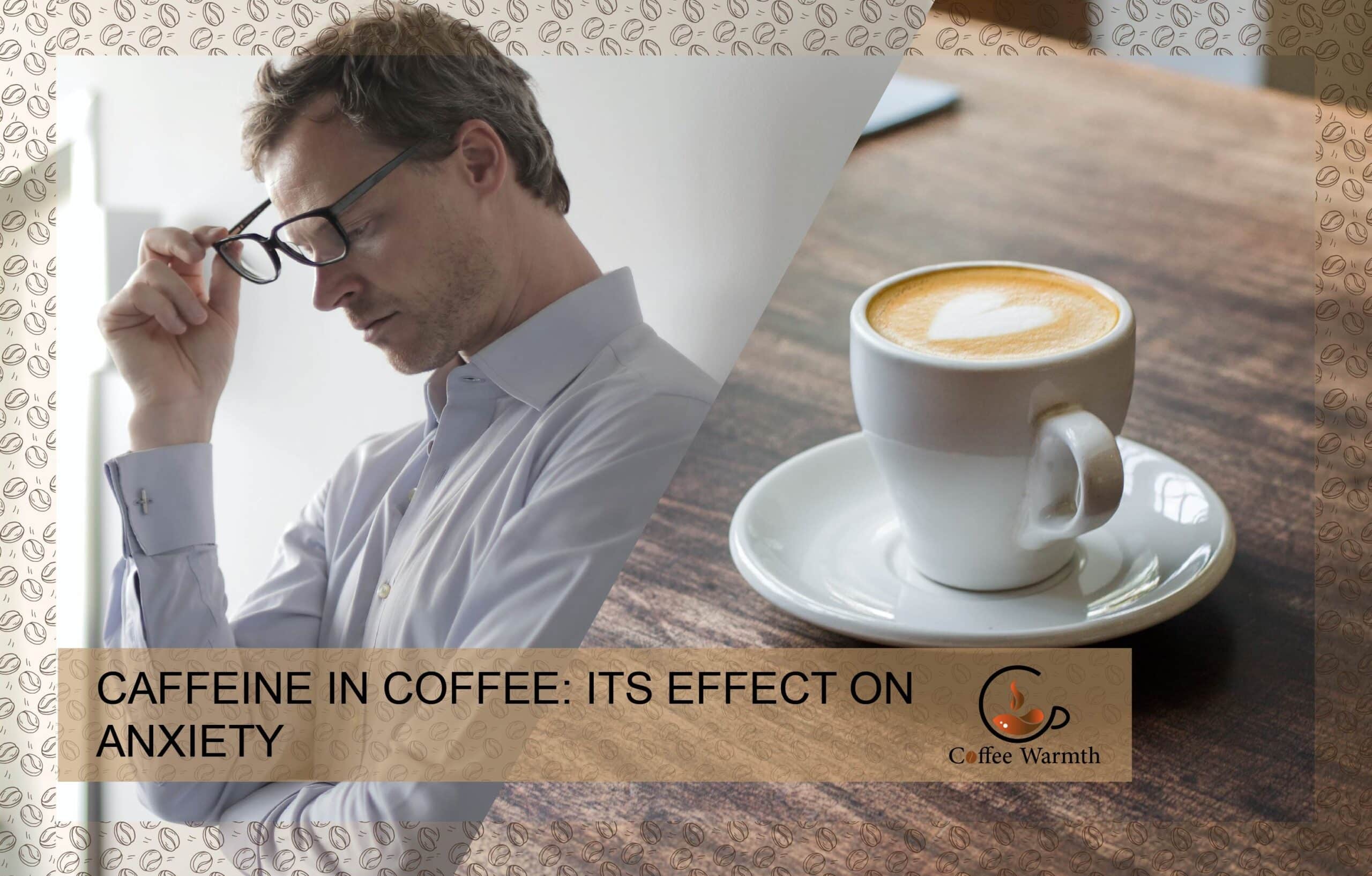Anxiety is an emotion characterized by feelings of tension, worried thoughts, nervousness, and physical changes like increased blood pressure, sweating, trembling, dizziness, or a rapid heartbeat, as defined by American Psychological Association (APA).
Drinking coffee is known to impact anxiety in both healthy individuals and those diagnosed with generalized anxiety disorders. Caffeine in coffee impacts anxiety by antagonizing adenosine A2A receptors. Caffeine, then, activates the central nervous system and leads to changes in cognitive function, feelings, and mood. Coffee can impact cognitive function, feelings and mood both positively and negatively. Coffee induced anxiety can also present as physical symptoms like restlessness, increased heart rate, sweating, and coffee jitters. The extent of the effect on cognitive function, feelings, and physical symptoms depend on dosage, general health condition, and time of caffeine intake.
Consuming low coffee dosage has a euphoric effect but drinking coffee beyond FDA’s daily recommendation of 4-5 cups (32-40 fl.oz.) leads to anxiogenic symptoms. People with diagnosed anxiety disorders, panic disorders, and caffeine sensitivity are more prone to coffee induced anxiogenic symptoms compared to healthy individuals.
Caffeine and coffee induced anxiety can last as long as caffeine stays in your system. On average, caffeine stays in the body for 5 hours. So, the best bet to get rid of this anxiety is by waiting, drinking water, or exercising.
How Does Caffeine in Coffee Affect Anxiety?
Caffeine in coffee affects anxiety both positively and negatively. At low dosage, coffee promotes alertness and good mood whereas at high dosage it causes anxiety. Caffeine stimulates the central nervous system influencing both cognition and emotions of an individual. The effects on cognition and emotions vary on individual responses to caffeine.
At low doses, caffeine in coffee prevents anxiety by increasing alertness, vigilance, and improving the mood. A study published in Peer-reviewed Journal PLOS One, studied the effect of coffee consumption on psychological well-being of 50,000 older women. Researchers found drinking 2-3 cups (16-24 fl. oz.) of caffeinated coffee a day decreased anxiety and depression risk by 15% compared to drinking 1 cup (8 fl. oz.) or less per week. The protective effect of caffeine on anxiety is by the release of dopamine and serotonin which enhances mood and reduces anxiety.
Another study published in Food and Chemical Toxicology states that pattern and dose of coffee consumption affects anxiety. Drinking coffee in moderate amounts increases mental functioning and decreases fatigue but large amounts increases anxiety.
Caffeine in coffee negatively influences anxiety by the antagonistic role of caffeine on adenosine receptors. Caffeine takes control over the circadian rhythms and mood by blocking adenosine receptors, according to the book ‘Encyclopedia of Sleep and Circadian Rhythms’.
Drinking 5 cups (40 fl. oz.) of coffee induces anxiety in healthy adults as stated by Lisa Klevebrant from Uppsala University. Another literature review in Current Neuropharmacology Journal also states that high doses of caffeine in coffee causes anxiety and mood disorders.
The American Psychological Association (APA) conducted a study on the effect of caffeine in adults. APA found increased anxiety, depression, and hostility after administration of 150 or 300 mg caffeine per 45.36 kg body weight.
The figure below draws a comparison how caffeine in coffee affects anxiety both positively and negatively.

Can Drinking Coffee Trigger Panic Attack?
Yes, drinking coffee can trigger panic attacks due to the effects of CO2 accumulation (caused by rapid breathing) on the brain and blockage of adenosine receptors by caffeine. Panic attacks are sudden attacks of anxiety and severe feelings of fear accompanied by physiological responses like increased heartbeat, rapid breathing, and perspiration.
According to a study published in General Hospital Psychiatry, drinking 5 cups (40 fl. oz.) of coffee or 400-750 mg caffeine triggers spontaneous panic attacks in people with panic disorders. Another study in JAMA Psychiatry states that drinking even one cup (8 fl. oz.) of caffeine increases sensitivity in patients with panic disorders.
However, normal healthy adults do not get a panic attack by drinking coffee as stated by a study in Psychiatry Research.
Can Drinking Coffee Worsen Morning Anxiety?
Yes, drinking coffee can worsen morning anxiety by increasing cortisol or stress hormone levels. Morning anxiety is an increased feeling of stress and anxiety upon waking up. It is characterized by restlessness, difficulty breathing, chest tightness, perspiration, and racing thoughts.
Drinking coffee can worsen the morning anxiety due to the impact of caffeine on cortisol levels, as mentioned in a study in the Journal of Pharmacology Biochemistry & Behavior. According to the Anxiety Disorder Association of Victoria, our bodies naturally produce cortisol or stress hormone in the morning to wake us up. However, drinking coffee first thing in the morning further raises cortisol levels activating the body’s ‘fight or flight response’. The body’s ‘fight or flight’ response increases heart rate, blood pressure, and breathing rates which worsens the morning anxiety.
What are the symptoms of caffeine induced anxiety?
The symptoms of caffeine induced anxiety are restlessness and nervousness, rapid heart rate, coffee jitters, sweating, and insomnia and these are illustrated in the image below.

Studies from Journal of Behavioral Medicine, Depression and Anxiety Journal, JAMA Psychiatry, Journal of Medicinal Food, and American Psychological Association provide evidence of these symptoms.
Restlessness and Nervousness
Prof Peter Tyrer at Imperial College, London, states that anxiety is characterized by restlessness. Caffeine induced anxiety causes similar feelings of restlessness in patients with generalized anxiety disorder.
Rapid heart rate
Caffeine and anxiety is linked with heart rate variability at rest and during exercise, according to a study in the Depression and Anxiety Journal. Another study published in the Journal of Behavioral Medicine states that 125 mg caffeine or 1-2 cups (8-16 fl. oz.) of drinking coffee increases heart rate and causes anxiety shortly after ingestion.
Coffee Jitters
Coffee jitters result from the stimulating effect of caffeine on the central nervous system. The symptoms of coffee jitters are heightened alertness, increased heart rate, enhanced cortisol levels, and perspiration. High level of alertness interferes with sleep and causes jittery feelings.
A study published in the Journal of Caffeine Research studied mood changes in 29 coffee consumers. Each person consumed 150 mg caffeine and mood changes were monitored 30 minutes post ingestion. The results showed feelings of alertness and jitteriness in the individuals.
Sweating
A study in JAMA Psychiatry states that 500 mg caffeine or 5-6 cups (40-48 fl. oz.) of drinking coffee causes increased sweating and anxiety in patients with generalized anxiety disorder. Another study published in Journal of Medicinal Food concludes 3 mg/kg caffeine increases sweating sensitivity during any physical activity.
Insomnia
Caffeine induced anxiety disrupts sleep patterns due to high alertness, restlessness and nervousness. According to the American Psychological Association, the state of anxiety impacts sleep homeostasis leading to insomnia.
How to Know If You Have Coffee Jitters?
Coffee jitters present as physical signs and symptoms including shaky hands, sweating, anxiety, increased heart beat, dizziness, shortness of breath, and muscle tremors. A study in the Journal Nutrients found out the acute effect of caffeinated black coffee on coffee jitters in healthy individuals. The results showed that 220 ml (7.4 fl. oz.) black coffee or 150 mg caffeine raised jittery ratings slightly 30 minutes after consumption.
How Much Caffeine Can Cause Anxiety?
Drinking more than 4 to 5 cups (32-40 fl. oz.) of coffee or 400 mg of caffeine per day can cause anxiety, according to the US Food and Drug Administration (FDA).
Consuming 150-300 mg caffeine per 45.36 kg body weight a day can cause anxiety, as declared by the American Psychological Association (APA).
The Australian Broadcasting Corporation states that drinking 3 espresso or 6-7 cups (48-56 fl. oz.) instant coffee daily can cause agitation and anxiety in healthy individuals.
An article published in the Neuropsychopharmacology Journal found that drinking only 2 cups (16 fl. oz.) of coffee can lead to anxiety in people who do not consume coffee regularly.
The graphic below illustrates the amount of caffeine that can cause anxiety according to aforesaid sources.

How long does caffeine induced anxiety last?
Caffeine induced anxiety begins 15-60 minutes after ingestion and lasts for 5-6 hours. According to a cardiologist Dr. Zachariah P. Zachariah, caffeine effects of anxiety can show individual variations, but they usually start in 15 minutes and last for about 2.5-5 hours. The individual variations depend on how quickly your body metabolizes caffeine.
Can decaf coffee cause anxiety?
No, decaf coffee cannot cause anxiety because it contains only trace amounts of caffeine. This small amount can trigger anxiety only in caffeine sensitive people. According to a study published in the Nutrition Journal, drinking more than 5 cups (40 fl. oz.) of decaffeinated coffee a day did not cause anxiety symptoms in 40 healthy individuals.
Decaf may cause anxiety if someone drinking caffeinated coffee regularly switches to decaf. That’s because the body has been accustomed to high levels of caffeine.
Can you drink coffee while taking antidepressants?
Whether you can or cannot drink coffee while taking antidepressants depends on how your body responds to caffeine. Caffeine and antidepressants metabolize slowly when taken together so anything more than 100 mg caffeine can cause anxiety in these individuals. Elisabeth Netherton, MD, from Mindpath Health states that drinking 2 cups (16 fl. oz.) of coffee or 200 mg caffeine in the morning could worsen anxiety symptoms while taking antidepressants.
Caffeine reduces the calming effects of xanax, zoloft, and ativan on the body. According to Bradley J Katz, MD, from University of Utah Medical Center, caffeine nullifies the calming effects of xanax.
How to get rid of caffeine anxiety after drinking coffee? (H3)
Caffeine anxiety after drinking coffee can be relieved by some of the following common ways according to medical professionals like Dr. Nicole Washington and Dr. Gregory Jantz.
- Drink plenty of water to flush out the caffeine from your system.
- Practice meditation and stress reducing exercises to counter anxiogenic effects of caffeine.
- Wait it out while doing some breathing exercises as caffeine effects wear out eventually.
